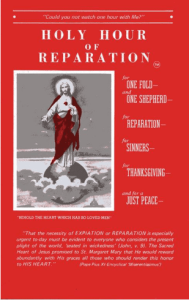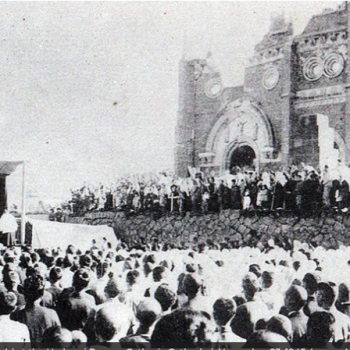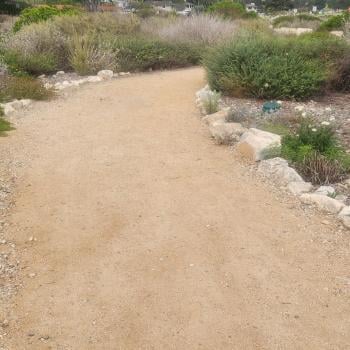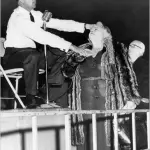Lisa Clark Dillon’s recent post, Teaching History in Hard Times: Denominational Colleges, addressed some things I’ve been thinking about this semester specific to teaching in a Christian institution. Most poignant were her description of discussions with colleagues about “how we have worked to introduce important ways of thinking and methods of scholarship in our classroom in faith-affirming ways. We talk about ‘tone’ a great deal, and how to use a vocabulary that reflects the values of our students while bringing them along the path of maturity, critical thinking and expanded understanding. We do this not for any manipulative or self-serving purposes, but because we truly think that what we are teaching will build stronger Christians and community members.”
I also view my teaching as an opportunity to build stronger Christians, but find myself thinking more about tone this semester, and not just my own; I’ve been careful to guide students as we speak to one another during class discussions. Why? Partly because this semester I am teaching a new course at a new institution and I’m unfamiliar with campus culture, but mostly because I, a Catholic professor, am teaching Renaissance and Reformation to a classroom of primarily Protestant students.
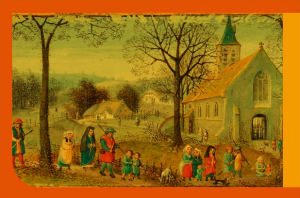
Image from “The medieval church: your guide to religion and worship in the Middle Ages” by Professor Nicholas Orme, History Extra, April 6, 2022
I’ve been teaching primarily Protestant students for over a dozen years, but my courses generally focused on the origins of Mexican Catholicism in sixteenth-century Mexico. Teaching Catholic history and sacramental theology so that students understand what was at stake when the mendicants brought Catholicism to New Spain is one thing. Teaching Catholic history leading up to the Reformation period is quite another.
Leading up to our first class meeting, I was really nervous. As Christians sitting down together in a classroom, we all had a personal stake in this history. It matters to us. But it doesn’t matter to all of us in the same way. What approach should I take?
After seeking advice from a Catholic colleague who had taught Ren & Ref for a decade at a different university among primarily Protestant students, I decided not to reveal to students that I was Catholic. I didn’t want any of them to feel inhibited by their professor’s faith, or to alter what they would say in response to a reading because they were worried they might offend me. This is a history course, after all, not a theology course. We are here to focus on the texts.
And so, I told them that in this class, like in any history class, what matters is what the people at the time believed, not what we believe, so we will use evidence from the readings to argue our points and enter into historical debates about theology by referencing the primary readings, not by referencing our own beliefs. What we believe doesn’t matter.
We’ve been operating this way for three weeks; I’ve had to remind students a few times to stick to the texts, and I’ve stumbled a few times when talking about Catholic beliefs because I’m being so careful not to favor my own deeply-held convictions or let slip how much I love and lean on my faith, but mostly we’ve stuck to the texts.
And you know what? It’s not working. Because what we believe does matter.
***
I first learned about the Protestant Reformation in my Catholic high school, and the book we used called it the Protestant Deformation. Conversations with my classmates were mainly about how anyone could give up the beauty of our faith or believe anything the reformers had to say. Few of us had ever met a Protestant. I never had. After Sunday Mass, friends would talk about having to park in the “heretic’s parking lot” when our lot was full. They were talking about the Lutheran church across the street.
Looking back, I am horrified. but I imagine some of my Protestant students grew up with similar negativity about Catholics. Both sides have misconceptions about one another. We all believe in Christ, so why do we act so unChristlike with one another?
This class presents an opportunity for healing.
I did not reach this conclusion on my own. I spent an hour on my knees before the Blessed Sacrament last week in our parish’s First Friday Holy Hour of Reparation. As I was praying, I was thinking about my students, and how most of them wouldn’t understand the depth of emotion I was feeling toward what appears to be a round wafer exposed in a monstrance on the altar, but whom I believe to be the Body, Blood, Soul, and Divinity of Christ. At first, I felt deeply saddened by this divide, but as the minutes passed and I opened my heart to Christ, I felt Him nudging me, reminding me that He loves me and my students, and that despite our confessional differences, I can be a conduit for His love, if only I would let Him. By the end of the Holy Hour, when the priest elevated the monstrance to bless us, to allow Christ to bless us, I was weeping.
Cover of the Holy Hour of Reparation I did at my parish. Image courtesy of Christ the King Books and Gifts
Yes, I am teaching a history course. And yes, we need to focus on the texts. But we are also Christians studying Christian history in a Christian institution. Most of us chose the institution because of its Christian identity. That’s certainly the reason I agreed to teach there.
Reading, analyzing, discussing, and debating key texts emerging from the Renaissance and Reformation period with Christians, both Protestant and Catholic, is a unique opportunity to learn about one another’s faith traditions as well as from one another. To ask questions. To seek answers. To understand. And to love.
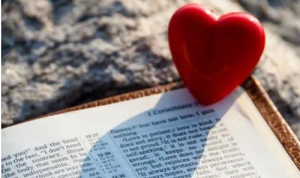
Image captured from “Loving Others as a Christian in Today’s Secular World” by Demetra Muingbeh,In the Mirror of God: Helping Christian Women Think Biblically and Conquer Everyday Life blog, January 31, 2022


